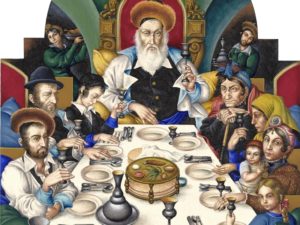The Torah portion for the first day of Pesach is Exodus 12:21-51, describing the origin of Pesach. A special maftir reading is added, Numbers 28:16-25, which contains commandments for the observance of Pesach. The Haftarah is Joshua 5:2-6:1 plus 6:27, telling how the Israelites observed Pesach before they approached Jericho. (Ashkenazim add Joshua 3:5-7, in which G-d tells Joshua, “I will exalt you in the sight of all Israel so they shall know I will be with you as I was with Moses.”)
The Torah portion for the second day of Pesach is Leviticus 22:26-23:44, giving commandments for the observance of Shabbat, Pesach, and other holidays. The maftir for the first day is also read. The Haftarah is II Kings 23:1-9 plus 23:21-25, describing how King Josiah read to Judah the scroll found in the Temple, how he attacked the worship of idols in the kingdom, and how he restored the Pesach sacrifices in the Temple.
The Torah portion for the Shabbat during Pesach is Exodus 33:12-34:26, which includes a commandment to observe Pesach. A special maftir is read, Numbers 28:19-25, describing sacrifices for Pesach. The Haftarah is Ezekiel 37:1-14, containing the prophet’s famous vision of the Valley of Dry Bones. In addition, the Song of Songs is read as the megillah for the holiday.
The Torah portion for the seventh day of Pesach is Exodus 13:17-15:26, describing the parting of the Sea of Reeds and the drowning of the Egyptian army and the song the Israelites sang afterward. Numbers 28:19-25 is added as maftir. The Haftarah is II Samuel 22:1-51, containing the song David sang after being delivered from his enemies.
The Torah portion for the eighth day of Pesach is Deuteronomy 15:19-16:17, stating commandments for the observance of Pesach. Numbers 28:19-25 is added as maftir. The Haftarah is Isaiah 10:32-12:6, containing a prophecy of the coming of the Messiah.
This image of a Pesach seder is from the Haggadah edition illustrated by Polish Jewish artist Arthur Szyk.

